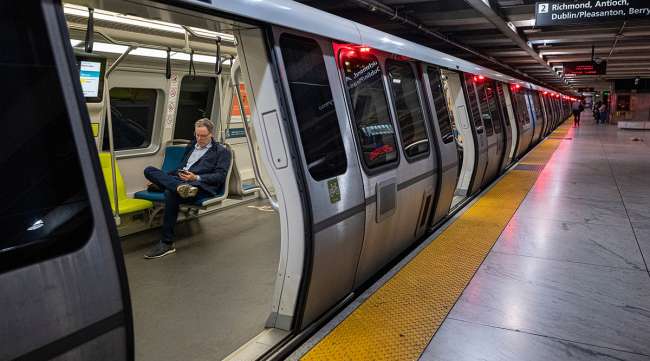Bloomberg News
Silicon Valley Subway Project Nabs $5.1B for Bay Area Link

[Stay on top of transportation news: Get TTNews in your inbox.]
The long-awaited subway project linking California’s Silicon Valley to parts of the San Francisco Bay Area is set to receive $5.1 billion in federal funding, helping to bring one of the costliest transportation projects in the U.S. closer to reality.
The $12.7 billion project will extend the Bay Area Rapid Transit District 6 miles through San Jose and into the smaller city of Santa Clara by 2036.
“We’ve had this dream of high-capacity rail connecting the entire Bay, and we are still not there,” San Jose Mayor Matt Mahan said. “This has been 30 years in the making.”
The Federal Transit Administration unveiled the BART deal Aug. 2, only weeks after New York’s $16 billion Gateway tunnel project secured $6.9 billion from the agency, its largest grant ever. The federal funding surge comes following President Joe Biden’s trillion-dollar infrastructure law passed in 2021.
Jeff Loftus of FMCSA joins TT’s Seth Clevenger to discuss the current outlook on ADAS technology and how it will affect the industry at large. Tune in above or by going to RoadSigns.ttnews.com.
RELATED: Biden’s ‘Infrastructure Decade’ Becoming More Concrete
But even as public transit infrastructure sees historic funding, inflation and cost overruns have eroded the impact. Cost estimates for bringing BART trains to Silicon Valley have nearly doubled in the past four years, and the Santa Clara Valley Transportation Authority, which is managing the construction, still needs to close a $700 million funding gap.
Part of the high cost stems from plans to build a massive tunnel about the width of a four-lane highway through downtown San Jose.
Mahan said the local transit authority is looking to renegotiate contracts for cost savings.
“We’re going to have to come together around the table, just as families do every single day in our city, and make some tough trade-offs,” the mayor said.
RELATED: Buttigieg Promotes Infrastructure Law During Election Year
The surge in federal funding also comes as transit agencies across the country see their ridership upended by remote work. BART ridership as of June was about 43% of pre-pandemic levels, agency data shows. Across the San Francisco Bay Area, return-to-office levels are still less than half of pre-pandemic numbers, according to data from Kastle Systems.
A federal study predicts 14,000 daily ridership for the new line. That’s a 40% drop from pre-pandemic estimates by the Santa Clara Valley Transportation Authority.
Want more news? Listen to today's daily briefing below or go here for more info:





